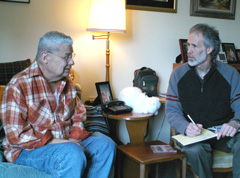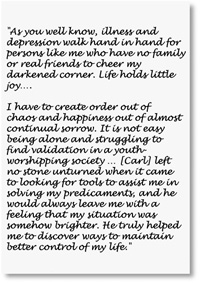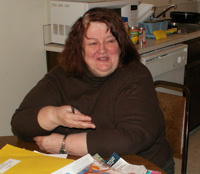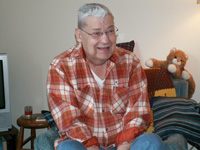PEARLS Gives Seniors with Minor Depression New Hope
January 2007

Chuck Lazenby (left) of Seattle talks with Carl Kaiser, a counselor in the Program to Encourage Active, Rewarding Lives for Seniors (PEARLS). Enlarge picture.
It's easy to open up to Carl Kaiser, with his calm nature and understanding smile, and many people do. As a counselor in Seattle's Program to Encourage Active, Rewarding Lives for Seniors (PEARLS),* Kaiser visits the elderly every day, listens to their problems, and helps them figure out solutions. Kaiser estimates he has helped more than 60 seniors overcome minor depression since 2004.
PEARLS, developed at the University of Washington's Health Promotion Research Center with funding from the Centers for Disease Control and Prevention, is a six-month long program consisting of eight, in-home visits with a counselor.
One client who had limited vision told Kaiser, "I just can't contribute any more." Another woman spent weeks lying hopelessly in bed after recovering from pneumonia. Both found help in PEARLS, which uses structured behavioral therapy and positive event scheduling to resolve depression. The counselor helps the client name and write down the factors contributing to his or her depression, and to develop and evaluate solutions.
Minor depression is characterized by loss of interest or pleasure in
activities, and feelings of sadness or hopelessness. It strikes about 14
percent of seniors, many of whom are dealing with isolation, loss of friends
and family, and debilitating chronic diseases. Seniors who have diabetes are
more than twice as likely as other people their age to be depressed.
"I tell them, just like the cold or the flu has symptoms, so does
depression," Kaiser said. "There is a close connection between depression
and unsolved problems. If the problem is, 'I can't do anything worthwhile,'
the goal can be, 'Find something I can do on a small scale that will be
beneficial to other people.'"
 Enlarge a letter that PEARLS
participant Lacey Gannon wrote to the city of Seattle.
Enlarge a letter that PEARLS
participant Lacey Gannon wrote to the city of Seattle.Kaiser helped the woman with limited sight find ways to help others, such as knitting baby blankets and calling isolated people—activities suited to her skills, interests, and personality. Other components of PEARLS include scheduling social and physical activities and planning simple pleasures—such as taking a walk, calling a friend, or soaking in a hot bath.
In its three-year study phase, PEARLS was shown to eliminate depression completely for more than a third of participants. Of seniors in a comparison group, who received usual care, only 12 percent eliminated depression completely. PEARLS also reduced depressive symptoms by half for 43 percent of participants—almost three times as many people achieving that result as in the comparison group. PEARLS has also been shown to reduce hospitalizations—for any reason—among participants.
Researchers attribute the success of PEARLS to the behavioral therapy, which affects the same parts of the brain that some antidepressant drugs do, according to Dr. Jim LoGerfo, director of the Health Promotion Research Center. Behavioral therapy can be more permanent than drugs, is less expensive, and can be used outside a clinical setting.
Because the clients come up with solutions of their own, they feel capable of following through on them.
"It's an empowering, skill-building approach," said researcher Sheryl Schwartz. "When you learn a new skill, no one can take that away from you."
Catherine Peten, 68, said she started to feel blue in May 2004 after coming down with pneumonia. Even after she recovered from the illness, normal activities seemed too difficult.
"That was when everything fell apart," she said. "It was like a pit. I was trying to dig myself out. I couldn't do it alone. I couldn't even sit up. And my house was so bad. I couldn't get going."
Her social worker recommended PEARLS, and Kaiser stepped in as her
counselor. Working with Kaiser, Peten listed all her medications. After
consulting with a psychiatrist, Kaiser informed her, to her surprise, that
three of her medications cause drowsiness. Peten talked to her doctor, who
was able to change her prescriptions. Peten thought of other things she
could do to encourage herself to get out of bed, such as plan to attend
religious services with a friend and set out clothes the night before.
"All I can say is it works," she said of PEARLS. "I have to make myself
go on ahead and do what needs to be done. I know how to do that now."

Above, Seattle's famed Pike Place Market and the Seattle skyline. Participants in PEARLS are encouraged to schedule time for pleasant events such as taking walks to the market or socializing with friends.
PEARLS is offered by the City of Seattle's Adult and Disability Services division to low-income seniors who receive state social work care. Researchers at the Health Promotion Research Center hope it can be used statewide. Of about 40,000 seniors in Washington who receive state case management, about 8,000 have minor depression or dysthymia, a chronic form of mild depression, and could benefit from the program, Dr. LoGerfo said. Additional organizations are giving PEARLS a try. Seattle's Northshore Senior Center is offering PEARLS to members, and Senior Services of Seattle/King County and the Asian Counseling and Referral Service are training social workers to provide PEARLS counseling. A home health agency in Houston has also started offering a variant of the program.
Implementing the program presents some difficulty to social service agencies, which are already strapped for resources, Schwartz said. Training case managers takes time, data collection is complicated, and getting long-term funding is a challenge.
To help obtain more money to run the program, the City of Seattle is working on a study that will track financial savings that PEARLS brings about, said Rosemary Cunningham, a planning manager at the city's Aging and Disability Services. Organizers believe that PEARLS will show cost savings because once people have their depression under control, they are better at taking care of themselves in general and have lower medical costs.
"We're trying to take these studies and find sustainable funding sources," Cunningham said.
The Health Promotion Research Center is also adapting a version of the program to be offered in senior centers instead of clients' homes, so that it can reach more people. The center is also studying which parts of the program are most effective and why. Recently, researchers received a grant to adapt PEARLS for use with adults who have epilepsy.
In the meantime, Kaiser continues to find the work rewarding. "I like having a variety of opportunities to see people change and respond and find their depression going down," he said. "It feeds my spirit."
Barbara Myerson's story: "I would always leave our meetings with a feeling of hope."

Barbara Myerson pulled a stack of old pictures from under the coffee table. They were all of her—a young, lithe, strong ballerina with a confident smile. Now 68 and obese, her earlier life seemed irretrievable.
To avoid an abusive husband, she spent 20 years moving from shelter to shelter, trying again and again to restart her life. The emotional wounds led to overeating, which caused weight gain, diabetes, and other health problems that she must now manage.
Although Myerson had suffered serious depression in the past, now, she said, her depression had become "more typical of older people." She was lonely, low on money, and dealing with serious health problems. All those problems added up. "It sort of globs together into a general malaise," Myerson said. "You get to feeling, 'This is sort of the way it is.'"
Her latest sad feelings began after a recent trip to Colorado to visit family. She had been thinking of moving there to be closer to them, but said she felt humiliated and rejected instead.
"Because of my weight they didn't want me to sit in chairs. I was going to break things. I felt helpless and powerless. They left me feeling really bad about myself, that I wasn't fit to be around respectable people."
Upon returning home to Seattle, Myerson stopped attending meetings of a movie and discussion group, a crowd of senior, native New Yorkers who love to talk about culture and music and always seemed upbeat. "I began to be ashamed of myself, conscious of my appearance," she said. "I love the people so much in my group. I couldn't stand to think they were just tolerating me." She began staying at home and neglected her health.
Myerson discovered the PEARLS program through her state-assigned case manager. An analytical person, she connected with its method of separating problems and finding solutions one-by-one. "It's not general misery but something specific," she said.
For Myerson, those problems boiled down to not taking her medicine on time, not exercising, and not reaching out to socialize with people. With her counselor, she came up with solutions.
"I developed a schedule that I would follow from the moment I got up," she said. "Take my blood pressure, take my blood sugar, take my medications."
She tries to remember that her schedule is not really a choice; if she doesn't do the log and remember her medicine, she will experience pain and deteriorating health. One week's goal was, "Do not get distracted and get motivated."
Myerson began a regimen of medicine, acupuncture, and Chinese herbs, and noticed that her blood pressure dropped. She joined Overeaters Anonymous and tried to eat healthy meals. From another program for seniors, she was able to get exercise equipment for her home. PEARLS encourages clients to come up with pleasurable activities, and Myerson's list included reading and playing the piano.
One session away from completing PEARLS, Myerson said she was optimistic about rejoining her movie group, and she was thinking about exercising at a new senior center.
"We started identifying solutions, advantages and disadvantages," Myerson said. "It tended to focus on the same basic problems, but every week I would focus on a different aspect of the problem. I always would leave our meetings with a feeling of hope."
Chuck Lazenby's story: "I never used to laugh like this."

It was only after his partner David's death that Chuck Lazenby talked about their 50-year relationship and the grief he felt about David being gone.
David died on an Easter Sunday. Lazenby remembers getting in the car and driving around town. "I found a little church. I sat in the parking lot."
"I didn't have any confidence," said Lazenby, 74. "I couldn't make a decision. Actually, I was miserable. The apartment was nice, but I just sat there. I didn't do anything. I had a problem, but I didn't know where to go, who to contact, where to start. I thought after you lost a partner of 50 years, this is how you're supposed to feel. I figured that was life."
His feelings of helplessness increased when he tried to obtain an American flag to use at David's funeral, an honor bestowed by the U.S. Veterans Benefits Administration on all veterans. The funeral home told him only relatives of the deceased could take the flag. "They said, 'Who are you?' I said, 'I'm the guy he lived with for 50 years.' They said, 'We can't give you the flag.' I buried him without it."
He said he felt "suicidal and everything else" but thought it was just his grief and not depression. But when he saw a flier for the PEARLS study at a senior center, Lazenby wondered if the program was for him. He made a phone call.
The first visit by his counselor felt like school, Lazenby said. There was paperwork to do, making lists of problems. Lazenby thought he probably wouldn't go through with it.
But after the counselor left, he sat at his kitchen table and started working on it. "A light bulb went off in my head," he said. "I thought maybe there is something to this."
A retired office and payroll manager, Lazenby could not afford his rising rent. He needed a new place to live. He wrote that down on the paper. He also wrote down that he needed to socialize more. And he needed to exercise to help his diabetes.
After writing down the problems they seemed more manageable. Lazenby found a new apartment near downtown Seattle, in a building with many seniors. The new apartment has a bus stop a block away and Lazenby was able to get rid of his car. He also walks in the new neighborhood. "Here, in the front lobby, we greet each other. We sit down and talk to each other. My best friend down the hall is a Chinese lady."
He also became involved in a church group called "Spirit of the Sound," which reaches out to the lesbian and gay community. Through that group, he met filmmaker Drew Emery, who was working on documentaries about gay relationships. Lazenby shared his stories about life with David and his trouble getting the American flag when David died.
Emery's film, The Bridge, went on to win prizes and gain attention, and concerned community members presented Lazenby with an American flag mounted on a plaque with David's name.
The PEARLS problem solving method also helped Lazenby find an exercise machine. He learned about a once-a-year giveaway, called up a friend, and went and picked one up. Before PEARLS, that kind of problem would have seemed too difficult to manage, he said. PEARLS has given him self-confidence and self-empowerment.
Now, Lazenby stays active, attending plays with new friends. He appeared in Emery's next documentary, Inlaws and Outlaws. Lazenby laughs at the thought that he's now recognized for his roles in the movies. "I never used to laugh like this," he said in wonder. "I was a sourpuss."
"People asked how I'm able to survive this after 50 years. I said, well, I've got to give credit to the PEARLS study. It has completely turned me around. It's what saved me really. How lucky I was it came into my life. I probably would not have been here talking to you today."
He said he wishes he could bring the program to more people. "It's such a need out there that it's unbelievable. I've had more people say, I wish I could get involved. It isn't just whether people are gay or not, it fits the whole realm of people."
He sees many of his peers just getting through their weeks alone and sad. "People are just living their life to the end of the day."
* Links to non-Federal organizations are provided solely as a service to our users. This link does not constitute an endorsement of this organization by CDC or the Federal Government, and none should be inferred. The CDC is not responsible for the content of the individual organization Web pages found at this link.
- Page last reviewed: November 20, 2007
- Page last updated: November 20, 2007
- Content source: Division of Adult and Community Health, National Center for Chronic Disease Prevention and Health Promotion
Get email updates
To receive email updates about this site, enter your email address:
Contact Us:
- Prevention Research Centers
4770 Buford Hwy, NE
MS K-45
Atlanta, GA 30341-3717 - cdcinfo@cdc.gov

